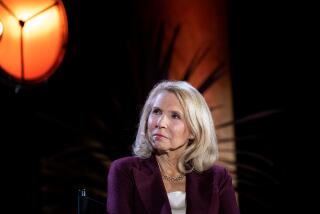Millard, Daughter Quit ComputerLand Posts
- Share via
A threatened revolt by hundreds of dealers has driven controversial ComputerLand founder William H. Millard and his 27-year-old daughter, Barbara, out of top management at the Hayward, Calif.-based chain of computer specialty stores.
The Millards acted to appease the dealers by bringing back the company’s previous president, Edward Faber, 52, who has replaced Barbara as president and her father as chief executive. The elder Millard remains chairman and his daughter remains a director.
The sudden shake-up followed meetings with Barbara Millard last week at which senior executives and a dealer advisory group “let her have it with both barrels” in a dispute over company policies, according to one of the executives.
With 820 franchised, individually owned stores selling IBM, Apple and other mainstream personal computers, 9-year-old ComputerLand is easily the largest of the computer store chains. Sales this year are expected to approach $2 billion.
But Millard’s privately held empire has been under siege all year. His control over the firm has been threatened in a successful lawsuit by investors, and the feud with dealers has been simmering for months over such issues as the royalty fees they pay ComputerLand.
Though the two disputes technically are unrelated, Millard’s chief adversary in the investors’ lawsuit, Claremont attorney Herbert Hafif, said Monday that the unrest among ComputerLand’s dealers buttresses court arguments that Millard “is not capable of successfully managing this company and maintaining good relationships with his franchisees.”
With Millard out of day-to-day management, Hafif said his clients are now “willing to give some form of relief” on the $25-million bond that Millard must pay to appeal the outcome of the lawsuit. ComputerLand has been having trouble raising the money.
In a jury trial that ended in March, an investor group won a 20% stake in ComputerLand--estimated at $200 million to $400 million--to satisfy an old debt owed to early principals in the company. The plaintiffs also won $125 million in punitive damages.
In a brief statement Monday that made no mention of the dealer uprising or the lawsuit, Millard said that he and his daughter were resigning as managers “in order to fully empower Ed and maximize his opportunity to make a major beneficial impact on the ComputerLand system. . . . I think this will be a very positive move both internally and externally.”
Faber, credited with building the huge ComputerLand network before leaving the company in 1983, spent Monday meeting with an association of the company’s dealers at a hotel near Chicago’s O’Hare airport. The initial reaction of dealers to Faber’s return was positive, the company said.
The dealers are independent operators who are franchised by ComputerLand and benefit by the big chain’s volume purchases of major brand computers. In return, they pay the corporation 8% of all sales as a royalty plus another 1% to cover advertising expenses; those payments constitute the company’s principal source of revenue. The 8% figure has remained constant during a long computer sales slump that has seen stiff price cutting, and dealers’ margins have been cut sharply.
“I’m not sure but what if I was a dealer, I wouldn’t have felt the same way,” said Roger Lewis, ComputerLand’s senior vice president-marketing. Lewis said the dealers didn’t think that Millard was willing to negotiate.
Lewis said Faber proposed to dealers Monday a cut in the advertising fee to 0.5% and in the royalty fee to as low as 3% for dealers who sell 75% as many computers as they did last year. By comparison, Millard had offered to reduce the royalty fee to 5% for dealers who increase their sales by 15%.
Faber also promised to review the entire relationship between ComputerLand and its franchised dealers.
Though the appointment of Barbara Millard as president in 1984 raised eyebrows among some dealers because of her youth and relative lack of experience, Lewis said the company’s top executives now believe that “she has done her job by getting Ed Faber to come back and take her job.”
More to Read
Inside the business of entertainment
The Wide Shot brings you news, analysis and insights on everything from streaming wars to production — and what it all means for the future.
You may occasionally receive promotional content from the Los Angeles Times.









